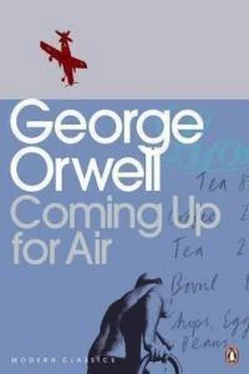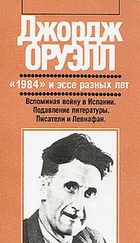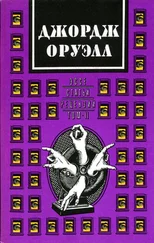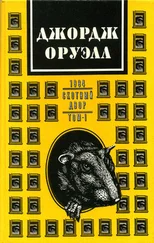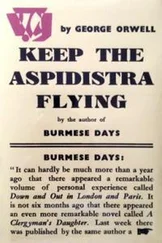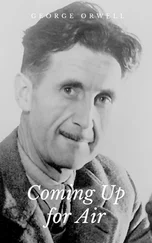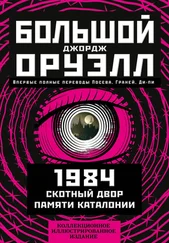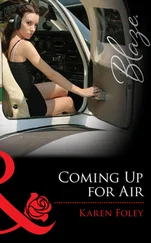Джордж Оруэлл - Coming Up For Air
Здесь есть возможность читать онлайн «Джордж Оруэлл - Coming Up For Air» — ознакомительный отрывок электронной книги совершенно бесплатно, а после прочтения отрывка купить полную версию. В некоторых случаях можно слушать аудио, скачать через торрент в формате fb2 и присутствует краткое содержание. Год выпуска: 2014, Издательство: epubBooks Classics, Жанр: Классическая проза, на английском языке. Описание произведения, (предисловие) а так же отзывы посетителей доступны на портале библиотеки ЛибКат.
- Название:Coming Up For Air
- Автор:
- Издательство:epubBooks Classics
- Жанр:
- Год:2014
- ISBN:нет данных
- Рейтинг книги:3 / 5. Голосов: 1
-
Избранное:Добавить в избранное
- Отзывы:
-
Ваша оценка:
- 60
- 1
- 2
- 3
- 4
- 5
Coming Up For Air: краткое содержание, описание и аннотация
Предлагаем к чтению аннотацию, описание, краткое содержание или предисловие (зависит от того, что написал сам автор книги «Coming Up For Air»). Если вы не нашли необходимую информацию о книге — напишите в комментариях, мы постараемся отыскать её.
Coming Up For Air — читать онлайн ознакомительный отрывок
Ниже представлен текст книги, разбитый по страницам. Система сохранения места последней прочитанной страницы, позволяет с удобством читать онлайн бесплатно книгу «Coming Up For Air», без необходимости каждый раз заново искать на чём Вы остановились. Поставьте закладку, и сможете в любой момент перейти на страницу, на которой закончили чтение.
Интервал:
Закладка:
In those days—till 1909, to be exact—Father could still afford an errand boy, and he used to leave the shop to him and come in to tea with the backs of his hands all mealy. Then Mother would stop cutting slices of bread for a moment and say, 'If you'll give us grace, Father', and Father, while we all bent our heads on our chests, would mumble reverently, 'Fwat we bout to receive—Lord make us truly thankful—Amen.' Later on, when Joe was a bit older, it would be 'YOU give us grace today, Joe', and Joe would pipe it out. Mother never said grace: it had to be someone of the male sex.
There were always bluebottles buzzing on summer afternoons. Ours wasn't a sanitary house, precious few houses in Lower Binfield were. I suppose the town must have contained five hundred houses and there certainly can't have been more than ten with bathrooms or fifty with what we should now describe as a W.C. In summer our backyard always smelt of dustbins. And all houses had insects in them. We had blackbeetles in the wainscoting and crickets somewhere behind the kitchen range, besides, of course, the meal– worms in the shop. In those days even a house–proud woman like Mother didn't see anything to object to in blackbeetles. They were as much a part of the kitchen as the dresser or the rolling–pin. But there were insects and insects. The houses in the bad street behind the brewery, where Katie Simmons lived, were overrun by bugs. Mother or any of the shopkeepers' wives would have died of shame if they'd had bugs in the house. In fact it was considered proper to say that you didn't even know a bug by sight.
The great blue flies used to come sailing into the larder and sit longingly on the wire covers over the meat. 'Drat the flies!' people used to say, but the flies were an act of God and apart from meat–covers and fly–papers you couldn't do much about them. I said a little while back that the first thing I remember is the smell of sainfoin, but the smell of dustbins is also a pretty early memory. When I think of Mother's kitchen, with the stone floor and the beetle–traps and the steel fender and the blackleaded range, I always seem to hear the bluebottles buzzing and smell the dustbin, and also old Nailer, who carried a pretty powerful smell of dog. And God knows there are worse smells and sounds. Which would you sooner listen to, a bluebottle or a bombing plane?
3
Joe started going to Walton Grammar School two years before I did. Neither us went there till we were nine. It meant a four–mile bike ride morning and evening, and Mother was scared of allowing us among the traffic, which by that time included a very few motor– cars.
For several years we went to the dame–school kept by old Mrs Howlett. Most of the shopkeepers' children went there, to save them from the shame and come–down of going to the board school, though everyone knew that Mother Howlett was an old imposter and worse than useless as a teacher. She was over seventy, she was very deaf, she could hardly see through her spectacles, and all she owned in the way of equipment was a cane, a blackboard, a few dog– eared grammar books, and a couple of dozen smelly slates. She could just manage the girls, but the boys simply laughed at her and played truant as often as they felt like it. Once there was a frightful scandal cause a boy put his hand up a girl's dress, a thing I didn't understand at the time. Mother Howlett succeeded in hushing it up. When you did something particularly bad her formula was 'I'll tell your father', and on very rare occasions she did so. But we were quite sharp enough to see that she daren't do it too often, and even when she let out at you with the cane she was so old and clumsy that it was easy to dodge.
Joe was only eight when he got in with a tough gang of boys who called themselves the Black Hand. The leader was Sid Lovegrove, the saddler's younger son, who was about thirteen, and there were two other shopkeepers' sons, an errand boy from the brewery, and two farm lads who sometimes managed to cut work and go off with the gang for a couple of hours. The farm lads were great lumps bursting out of corduroy breeches, with very broad accents and rather looked down on by the rest of the gang, but they were tolerated because they knew twice as much about animals as any of the others. One of them, nicknamed Ginger, would even catch a rabbit in his hands occasionally. If he saw one lying in the grass he used to fling himself on it like a spread–eagle. There was a big social distinction between the shopkeepers' sons and the sons of labourers and farm–hands, but the local boys didn't usually pay much attention to it till they were about sixteen. The gang had a secret password and an 'ordeal' which included cutting your finger and eating an earthworm, and they gave themselves out to be frightful desperadoes. Certainly they managed to make a nuisance of themselves, broke windows chased cows, tore the knockers off doors, and stole fruit by the hundredweight. Sometimes in winter they managed to borrow a couple of ferrets and go ratting, when the farmers would let them. They all had catapults and squailers, and they were always saving up to buy a saloon pistol, which in those days cost five shillings, but the savings never amounted to more than about threepence. In summer they used to go fishing and bird– nesting. When Joe was at Mrs Howlett's he used to cut school at least once a week, and even at the Grammar School he managed it about once a fortnight. There was a boy at the Grammar School, an auctioneer's son, who could copy any handwriting and for a penny he'd forge a letter from your mother saying you'd been ill yesterday. Of course I was wild to join the Black Hand, but Joe always choked me off and said they didn't want any blasted kids hanging round.
It was the thought of going fishing that really appealed to me. At eight years old I hadn't yet been fishing, except with a penny net, with which you can sometimes catch a stickleback. Mother was always terrified of letting us go anywhere near water. She 'forbade' fishing, in the way in which parents in those days 'forbade' almost everything, and I hadn't yet grasped that grownups can't see round corners. But the thought of fishing sent me wild with excitement. Many a time I'd been past the pool at the Mill Farm and watched the small carp basking on the surface, and sometimes under the willow tree at the corner a great diamond– shaped carp that to my eyes looked enormous—six inches long, I suppose—would suddenly rise to the surface, gulp down a grub, and sink again. I'd spent hours gluing my nose against the window of Wallace's in the High Street, where fishing tackle and guns and bicycles were sold. I used to lie awake on summer mornings thinking of the tales Joe had told me about fishing, how you mixed bread paste, how your float gives a bob and plunges under and you feel the rod bending and the fish tugging at the line. Is it any use talking about it, I wonder—the sort of fairy light that fish and fishing tackle have in a kid's eyes? Some kids feel the same about guns and shooting, some feel it about motor–bikes or aeroplanes or horses. It's not a thing that you can explain or rationalize, it's merely magic. One morning—it was in June and I must have been eight—I knew that Joe was going to cut school and go out fishing, and I made up my mind to follow. In some way Joe guessed what I was thinking about, and he started on me while we were dressing.
'Now then, young George! Don't you get thinking you're coming with the gang today. You stay back home.'
'No, I didn't. I didn't think nothing about it.'
'Yes, you did! You thought you were coming with the gang.'
'No, I didn't!'
'Yes, you did!'
'No, I didn't!'
'Yes, you did! You stay back home. We don't want any bloody kids along.'
Joe had just learned the word 'bloody' and was always using it. Father overheard him once and swore that he'd thrash the life out of Joe, but as usual he didn't do so. After breakfast Joe started off on his bike, with his satchel and his Grammar School cap, five minutes early as he always did when he meant to cut school, and when it was time for me to leave for Mother Howlett's I sneaked off and hid in the lane behind the allotments. I knew the gang were going to the pond at the Mill Farm, and I was going to follow them if they murdered me for it. Probably they'd give me a hiding, and probably I wouldn't get home to dinner, and then Mother would know that I'd cut school and I'd get another hiding, but I didn't care. I was just desperate to go fishing with the gang. I was cunning, too. I allowed Joe plenty of time to make a circuit round and get to the Mill Farm by road, and then I followed down the lane and skirted round the meadows on the far side of the hedge, so as to get almost to the pond before the gang saw me. It was a wonderful June morning. The buttercups were up to my knees. There was a breath of wind just stirring the tops of the elms, and the great green clouds of leaves were sort of soft and rich like silk. And it was nine in the morning and I was eight years old, and all round me it was early summer, with great tangled hedges where the wild roses were still in bloom, and bits of soft white cloud drifting overhead, and in the distance the low hills and the dim blue masses of the woods round Upper Binfield. And I didn't give a damn for any of it. All I was thinking of was the green pool and the carp and the gang with their hooks and lines and bread paste. It was as though they were in paradise and I'd got to join them. Presently I managed to sneak up on them—four of them, Joe and Sid Lovegrove and the errand boy and another shopkeeper's son, Harry Barnes I think his name was.
Читать дальшеИнтервал:
Закладка:
Похожие книги на «Coming Up For Air»
Представляем Вашему вниманию похожие книги на «Coming Up For Air» списком для выбора. Мы отобрали схожую по названию и смыслу литературу в надежде предоставить читателям больше вариантов отыскать новые, интересные, ещё непрочитанные произведения.
Обсуждение, отзывы о книге «Coming Up For Air» и просто собственные мнения читателей. Оставьте ваши комментарии, напишите, что Вы думаете о произведении, его смысле или главных героях. Укажите что конкретно понравилось, а что нет, и почему Вы так считаете.
